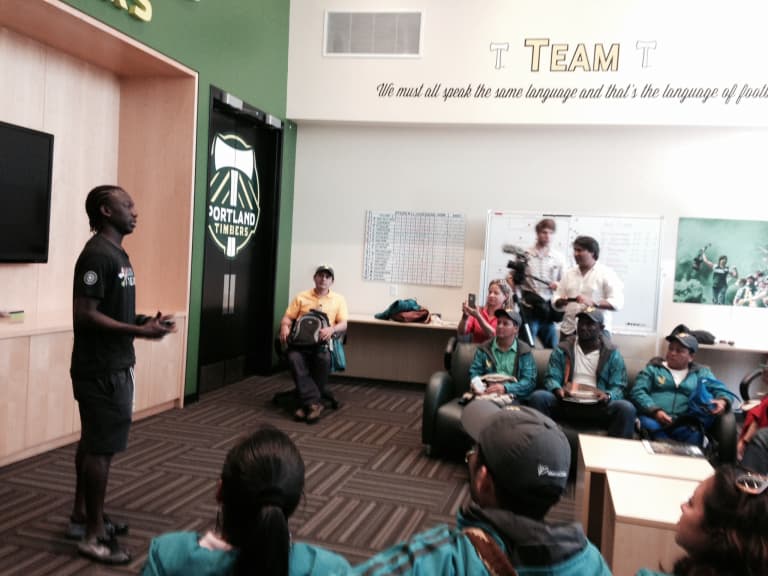Led by team members Stephen Oliver and Liz Sampson, the Sport for Change Colombia program is a Mercy Corps initiative that helps improve the lives of underprivileged children in areas of the South American country. In Colombia, the sport of choice is soccer, and Mercy Corps have been using the love of the sport as a means to try and solve more complex issues.
As the 2014 FIFA World Cup in Brazil has shown, sport can be a way to connect people across the globe through a common interest. Here in Portland, that sentiment was brought to Providence Park through a recent visit of Colombians hosted by Mercy Corps looking to explore methods of sport for change.
"The program aims to strengthen community leaders who are working with at-risk youth to harness the power of sports," said Oliver. "We use sports to translate into something broader, into life lessons that they can use."
According to Mercy Corps, youth in Colombia have been greatly affected by the violence that has seeped into their communities. A 50-year war between the government and paramilitaries involving the drug trade has devastated normal life for many Colombians. Child soldiers have become all too common, and Mercy Corps aims to help prevent recruitment into the guerilla groups through a positive outlet in sport.
As part of the program, Oliver and Sampson led a group that traveled around the city of Portland, from different companies to the Portland Police Department, in order to see how Oregonians were trying to battle their own social and economic issues. In meeting with American social programs, Mercy Corps hoped to be able to show the Colombian group the similarities between issues -- and solutions -- despite the distance and socioeconomic standing between the two countries.

"These problems exist everywhere in the world and we can use the same solutions everywhere in the world," said Oliver. "We can contextualize them for wherever we are, but the same methodologies and ideas to solve them are the same around the world."
"It's helpful for them to see that there's still places in America that need a lot of help, too," added Sampson.
The group also got a chance to meet up with Timbers midfielder Diego Chara, a Colombian national who is no stranger to the depth of the issues experienced in his home country or the trappings of life for those who have managed to find success and escape the conflict at home.
“Receiving this group of fellow Colombians here in Portland, my new home, was exciting,” said Chara. “I am confident that through this experience, each one of them got to know Portland, which has a distinct culture from our own.”
In touring Portland and meeting different groups, the Sport for Change program tried to pick up both technical knowledge in youth development training and a sense of what it's like to be an American in a total sense. In meeting with Chara, the Colombians got to know a true account from their countryman and as they met with various companies and governmental organizations, so too did they get a sense of the real issues facing the United States on a social level.
"We want them to experience the culture here in America and in Portland so they have a better understanding of who we are," said Oliver. "A better sense of what America is."
Part of that experience has been how soccer can connect us, not only through a game at Providence Park, or in a dusty green field in Bogotá, or this summer in Brazil. Although the United States was knocked out against Belgium on July 1, the group was able to see just how Oregonians rallied for the Timbers and for their countrymen on the USMNT. The idea was for the visitors to know that not only is there a corollary between social issues abroad between the two countries, but also in their love of the beautiful game as well.
Now, with their trip over and armed with new knowledge to help combat issues for at-risk youth, the Colombians are ready to expand upon what they’ve learned in their home country.
"They can't wait," said Oliver.











